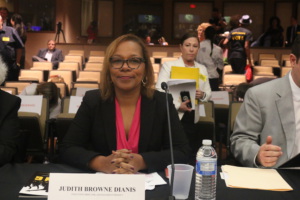The Voting Rights Saga in Florida Continues
May 9, 2019

May 9, 2019
“As we’ve learned in Florida, it’s too late after the vote is taken and counted to protect the civil rights of people of color. And the problem is, the federal government is not watching.”

On Monday, May 6, 2019, Advancement Project National Office testified before the U.S. House Committee on Administration in Miami during a hearing on the status of voting rights in Florida. As Judith Browne Dianis, our executive director, detailed in her testimony, Florida is a battleground in access to the polls. The state has a history of intentionally limiting access to the ballot box – and in a way that disproportionately disenfranchises voters of color.
In 2006 & 2007, Florida’s rigid matching requirements for voter registration disenfranchised tens of thousands of otherwise eligible voters, disproportionately Latinx, Haitian American, and African-American. During this period, 65 percent of the unmatched rejected applicants were either Latinx or African-American, even though Latinx communities comprised only 15 percent of the applicant pool and African Americans only 13 percent of the pool. Advancement Project National Office litigated on behalf of the Florida NAACP & the Haitian-American Grassroots Coalition. As a result, 16,000 unmatched voter applicants were added to the rolls on the eve of the registration deadline.
In 2011, Florida cut the number of early voting days and eliminated the final Sunday before Election Day, when Souls to the Polls programs increase Black voter turnout. The law’s cuts to early voting led to long lines and massive wait times on Election Day in 2012. These cuts impacted 102-year-old Desiline Victor who waited more than three hours to vote. She was later recognized by President Obama in his 2013 State of the Union Address.
In 2012, Florida attempted to purge thousands of voters from its voter rolls by using a flawed data matching process that wrongly targeted eligible citizens – disproportionately people of color. Advancement Project National Office research found that 87 percent of the people on Florida’s purge list were people of color and more than 50 percent were Latinx. We joined forces with LatinoJustice PRLDEF to bring a lawsuit that stopped the mass purge.
Last week, Florida’s legislature passed a bill undercutting Amendment 4, a ballot measure overwhelmingly approved by voters that automatically restores the voting rights of Floridians with past felony convictions. Gov. Ron DeSantis plans to sign the legislation into law. We won’t stop fighting for the voting rights of every Floridian. This month, we’re hosting five community hearings to amplify the voices of voters who faced challenges voting during the 2016 and 2018 midterm elections. Look out for this announcement!
“We know Congress must act to protect the voting rights of the people of Florida and elsewhere in the country. Just because voter turnout has increased, doesn’t mean that we have overcome,” said Judith Browne Dianis during the hearing. Advancement Project National Office is committed to acting in this moment as well.
Advancement Project National Office was honored to testify along with other panelists including former Tallahassee Mayor Andrew Gillum, Marleine Bastien of Fanm Ayisyen Nan Miyami, Inc. and Nancy Batista of Mi Familia Vota.
Watch our hearing remarks below. Explore our latest report, Democracy Rising, to see how felony disenfranchisement harms Florida’s Black communities and creates a web of disempowerment.